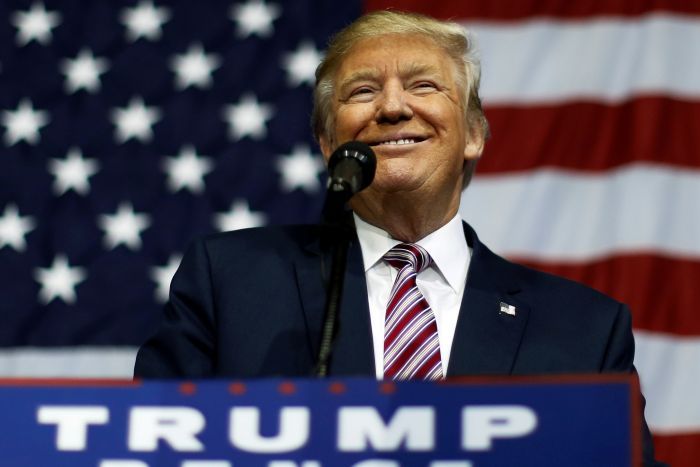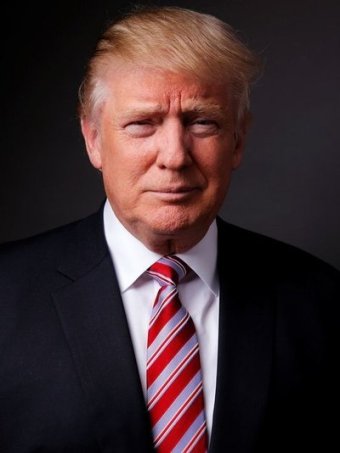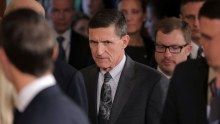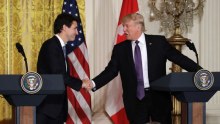US election: Why did evangelicals vote for Donald Trump?
Updated
A historic percentage of white Christian evangelicals voted for Donald Trump in this election, even though many doubt his faith. Mike Bird asks why.
Evangelicals make up approximately 25 per cent of the US population and exit polling suggests 80 per cent of white evangelicals voted for Donald Trump, compared to just 15 per cent of African-American/Hispanic/Asian evangelicals.
So just who are these evangelicals and why did they vote for Trump? The answers might be more complex than you realise.
In January this year, in the thick of the GOP primary, I was in Houston, Texas, delivering an invited lecture to a group of Christians in the buckle of the Bible belt.
I began my talk by asking three questions: Why don't Americans use the metric system? Why is the cheese orange? And who are the evangelicals who are voting for Donald Trump?
I got a response of riotous laughter because just about everyone there supported Ted Cruz and hoped a local Texan would defeat the vulgar New Yorker.
I asked the last question because, among my hundreds of American evangelical friends, colleagues, and acquaintances, I could count all of the Donald Trump supporters I knew on one hand.
So when Trump won the election, like many of my American evangelical friends, I was both shocked and despondent. But as the electoral fog clears, I now think I'm figuring out which evangelicals voted for Trump and why.
First, we need a short note on the history of American evangelicals.
What is the evangelical movement?
The evangelical movement emerged in the mid-twentieth century as a coalition of Christians who held to the fundamentals of the faith, but wanted to escape the anti-intellectualism and separation ethos of fundamentalist denominations.
Evangelicals were for the most part quite apolitical, until the 60s and 70s when they were galvanized into the religious right, first, over anti-segregation laws, and then in response to Roe v Wade, which legalised abortion across the US.
 Photo:
Trump has played the evangelicals - he has no record of professing faith, says Mike Bird. (Reuters: Jonathan Ernst )
Photo:
Trump has played the evangelicals - he has no record of professing faith, says Mike Bird. (Reuters: Jonathan Ernst )
The election as president of the quiet church-goer Jimmy Carter signalled the power of the evangelical voting bloc, with Time magazine declaring 1976 to be "The Year of the Evangelical".
The evangelical vote was then effectively harnessed by the Reagan and Bush campaigns, which made evangelicals a permanent fixture of the Republican Party.
However, since the 1990s, the evangelical movement has fragmented into conservative and progressive wings; become ethnically broader with many Black, Hispanic, and Asian evangelical churches; and developed into various factions that do not play well with each other.
For many pundits, by the mid-noughties, the evangelicals were a spent force, the demographics had changed, America was less white and less religious. How wrong they were! The evangelicals were dormant, but not gone.
Why don't evangelicals like Trump?
Second, I have to tell you that the evangelicals are not falling over themselves for Donald Trump en masse.
With some 16 million members, the Southern Baptist Convention is America's largest Protestant body, and it is solidly evangelical and largely Republican.
The Southern Baptist Convention has a political lobbying arm called the Ethics and Religious Liberty Commission. The head of the commission, Reverend Dr Russell Moore, has been severely critical of Donald Trump and Trump's supporters in the religious right.
Moore opposed Trump's racism and sexism from the beginning. So much so that Trump sent out a tweet criticising Moore as "a nasty guy with no heart".
It would be unimaginable for Republican nominees such as John McCain or Mitt Romney, who both had ambivalent relationships with evangelicals, to have put out such a negative statement about the representative of the nation's largest evangelical church.
A few weeks ago, Russell Moore's Erasmus lecture tackled the question, "Can the religious right be saved?" believing it to have been compromised by its support for Donald Trump.
He was damning in his indictment of the religious right, saying: "The Religious Right turns out to be the people the Religious Right warned us about."
After the shock result of Trump's victory, Moore wrote on his website about his concern for ethnic minorities in the US, saying:
"No matter what the racial and ethnic divisions in America, we can be churches that demonstrate and embody the reconciliation of the kingdom of God. After all, we are not just part of a coalition but part of a Body - a Body that is white and black and Latino and Asian, male and female, rich and poor. We are part of a Body joined to a Head who is an Aramaic-speaking Middle-easterner. What affects black and Hispanic and Asian Christians ought to affect white Christians. And the sorts of poverty and social unravelling among the white working class ought to affect black and Hispanic and Asian Christians. We belong to each other because we belong to Christ."
Moore is not the odd man out; many evangelicals, especially those associated with multi-ethnic churches, feel the same way.
Trump has clearly divided evangelicals, particularly between the old guard religious right, and the new generation who is eager to embrace multi-ethnic America and move forward in a confident pluralism in which America's Christian heritage is respected.
Given those divisions, the evangelical voting bloc can be divided into three basic tiers
First, the "America, God, and guns" evangelicals. These people are "evangelical" in a political and cultural sense.
They might only have limited or spasmodic church attendance, and rudimentary knowledge of Christianity, but they identify conservative religion as an indelible part of the overall cultural conservatism to which they are committed.
Second, "hold the nose evangelicals". These are the people who personally eschewed Trump's behaviour and racist rhetoric, but regarded him as the lesser of two evils.
They were concerned that Hillary Clinton would appoint activist judges to the Supreme Court, attack religious liberty, expand federal funding for abortion, and end democracy as they knew it. For them, Trump is a necessary evil.
Third, what I call the irenic evangelicals: those committed to the same beliefs and ethics as former generations, but who do not prize political influence at the expense of electing a morally compromised candidate who is likely to inspire resentment of racial and ethnic minorities.
They would rather have elected an inclusive democrat than a xenophobic demagogue with a history of sexual harassment.
All of that said, my impression is that religion was not the single biggest factor shaping the vote for Trump by white evangelicals.
This election was mostly a rural versus urban phenomenon
For example, if you look at the breakdown of how a state like Illinois voted, county by county, you'll see what I mean. The state itself is an absolute sea of red, with a couple of big blue squares that make up Chicago and a few other towns.
Chicago is so dense in population that, despite how every other county voted, the city alone can almost carry the entire state for Clinton.
America is a nation divided by city and country, between the educated and uneducated, elites and provincials, between rustic evangelicals and urban secularists.
Like most people, I assumed Trump would be trashed on November 8.
However, a man I know, Dr Anthony Bradley, an African-American scholar at the evangelical King's College, has been telling everyone all year to watch out for the rural white vote.
Bradley has pointed to books like Not Quite White: White Trash and the Boundaries of Whiteness by Matt Wray, and Hillbilly Elegy by JD Vance, to explain what is happening in American society that has led to the Trump phenomenon. It seems Bradley was right.
For what it's worth, I think Trump has played the evangelicals; he has no record of professing faith.
Although he identifies as a religious person when it suits his audience, other times he has bragged about serial adultery, and says he has never asked God for forgiveness. While his supporters in the religious right like to call Trump a "baby Christian," there is no evidence of authentic Christian faith in his life.
Anyway, I'm off to the USA again on Monday, or Trumpopolis as it might soon be called.
I'm sure my evangelical friends and I will have a lot to talk about.
Rev. Dr. Michael Bird is an Anglican priest and lecturer in Theology at Ridley College in Melbourne, Australia. He blogs on religious issues at Euangelion and tweets as @mbird12.
Topics: us-elections, religion-and-beliefs, christianity, race-relations, evangelism, united-states
First posted







